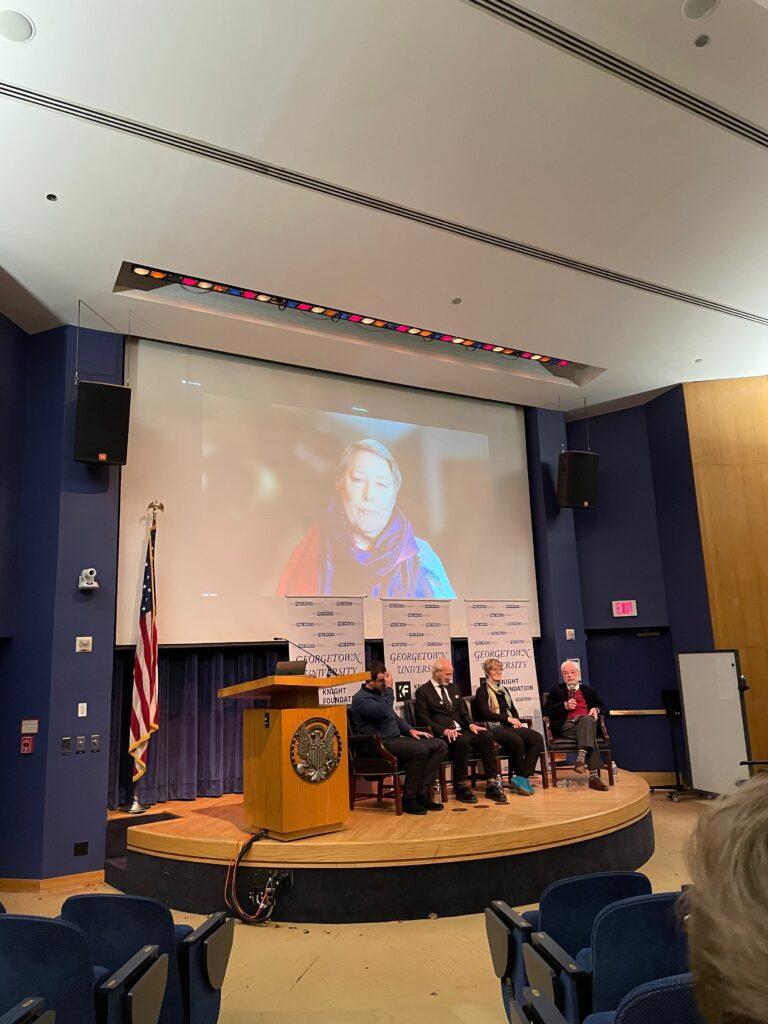The Georgetown University film and media studies program and the Free Speech Project — an independent, nonpartisan initiative focusing on free speech in the United States — hosted a March 14 panel regarding Julian Assange, founder of WikiLeaks, a site known for publishing high-security news and classified media.
Assange, an Australian citizen who remains in Belmarsh prison, a high-security prison in southeast London, was indicted in the United States on 17 espionage charges for allegedly conspiring to obtain and disclose national defense information: an offense that carries a maximum prison sentence of 175 years. The indictment follows WikiLeaks’ publication of classified materials obtained from U.S. soldier Chelsea Manning, formerly convicted of violations of the Espionage Act for disclosing classified and sensitive military documents.
Sanford Ungar, director of the Free Speech Project, moderated the panel, which featured Assange’s brother Gabriel Shipton and his father John Shipton.
Gabriel and John Shipton presented the trailer for their 2021 documentary, “ITHAKA,” which depicts the campaign to free Julian Assange. Gabriel Shipton said he was inspired to create the documentary after visiting his brother in prison.
“I’ve never seen Julian in a state like that before,” Shipton said at the event. “And I left that day feeling that I might not see him again.”
Allison Stanger, professor of international politics and economics at Middlebury College, and Jane Turner, whistleblower and former special agent for the FBI, also spoke at the panel.
The panelists said the debate surrounding Assange’s situation relates to his case’s potential legal precedent. Many journalists have expressed concerns that if Assange faces charges, they could face similar charges for reporting on national security.
The repercussions of the case depend on whether Assange is considered a whistleblower, according to Turner. Turner said a whistleblower is an insider who exposes evidence of illicit activity to the authorities or media outlets, a definition that she said does not fit Assange.
Turner said Assange is a publisher and therefore a part of the media, which gives him the right to publish classified information without the risk of criminal charges that, on the contrary, whistleblowers would face.
“Journalists and the media are protected under the First Amendment, which John Shipton referred to, which is extremely important, but we can’t get whistleblowing mixed in with the media,” Turner said at the event. “That’s just not how it works.”
Stanger brought up Assange’s alleged connections to Russia, which resulted in strong feelings from the audience members and other panelists, who began to speak over one another.
Jacob Sowers (CAS ’23), a contributing writer for the Free Speech Project, said the panel served as a chance to bring together different perspectives into an engaging discussion.
“The panel was a great opportunity to hear from four excellent speakers about their opinions on a complex and controversial subject,” Sowers wrote to The Hoya. “I’m proud that Sandy Ungar (director of FSP) and John McCabe (program manager/editor of FSP) were able to bring together such a fascinating and diverse group of opinions to produce healthy debate on an issue that has worldwide Free Speech implications.”
Sowers said he could tell emotions were running high among panelists and audience members.
“For me, one thing that was interesting to see was the emotion that was flowing throughout the room at all times — it was evident that the audience, as well as the family members of Julian Assange, were very invested in this issue and felt very strongly, one way or another, about Julian Assange’s case,” Sowers wrote.

The harsh conditions Assange faces in Belmarsh — including being held incommunicado, or denied access to family members, an attorney or an independent physician — are affecting his mental state, according to Gabriel Shipton.
Turner asked why Assange has not agreed to go to trial in the United States to escape these conditions. Stanger responded, saying the U.S. government has offered to allow Assange to carry out his sentence in his home country of Australia if he is convicted, and he would not have to reside in a maximum security facility.
Josh Rushing, an American broadcast journalist, said at the event that it makes sense that Assange does not want to go to trial in the United States because of a lack of trust in the justice system. Assange’s family and several audience members said they agreed with this assessment.
“What you see is a guy who’s in the harshest prison in the U.K., for publishing the truth, and when now having been prosecuted for anything is persecution before prosecution,” Rushing said. “And you’re asking that same individual, ‘Trust the U.S. system and come here, you’ll get a fair shake.’ You can see why he might be dubious of that.”




















